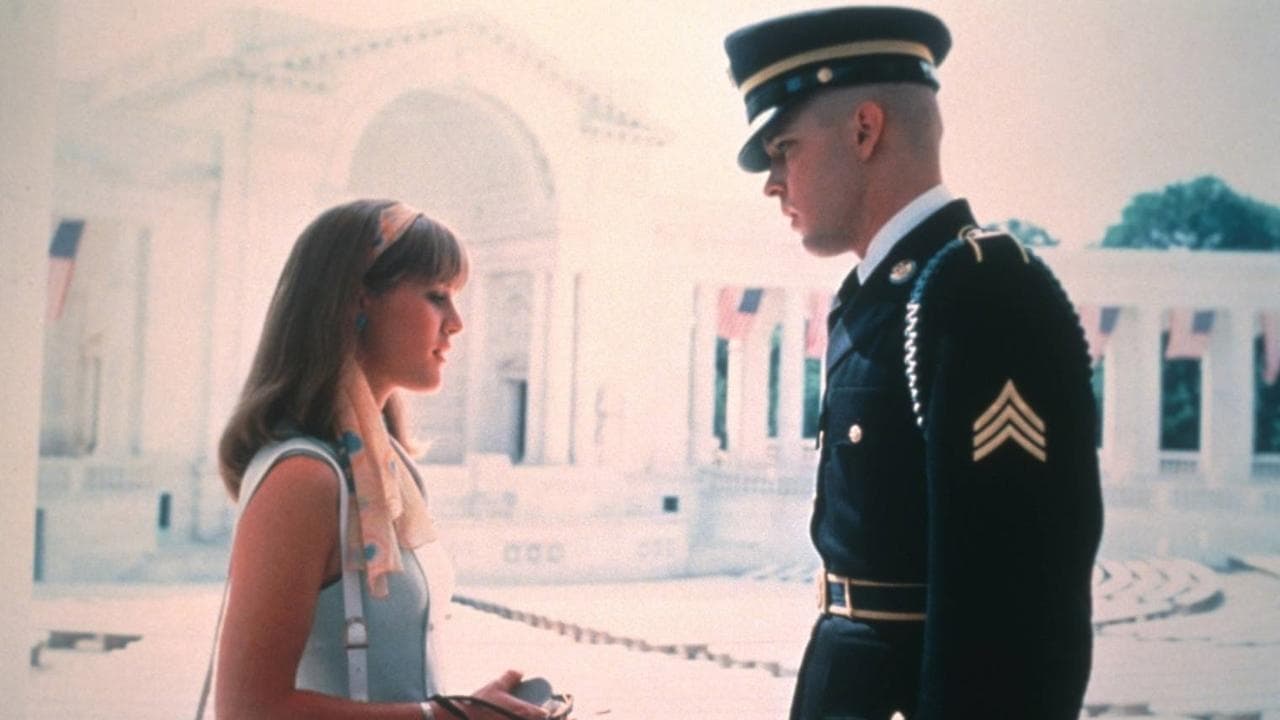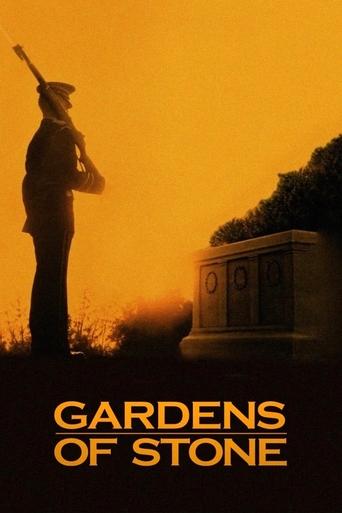Steineded
How sad is this?
Prolabas
Deeper than the descriptions
Sammy-Jo Cervantes
There are moments that feel comical, some horrific, and some downright inspiring but the tonal shifts hardly matter as the end results come to a film that's perfect for this time.
Roxie
The thing I enjoyed most about the film is the fact that it doesn't shy away from being a super-sized-cliche;
wsuddock
Coppola's fine production is unparalleled. The conflict between Caan and Huston is a tremendous and balanced treatment of the anti-war v. the military. If there is one movie which reflects the times. in all its facets ... this is it.Caan's finest role, I believe, played perfectly.Jones' voice, his carriage, etc. all combine into a truly believable, hard nosed yet, compassionate Sergeant Major. I think every member of the cast brought something to the movie, something good and grand."Here's to us and those like us.""Damn few left."
mercuryix2003
I saw Coppola's film twice, once because of his reputation, and the second time to see if I was missing anything. It was a very long two hours to discover that I hadn't.The film is beautifully shot, the script looks like it is going somewhere, and we wait for something to happen. And we wait.The film feels exactly like Waiting for Godot. In both the play and the film, nothing happens. Two major differences between them is that in the play, the author (and the audience) knows nothing is going to happen, and the film doesn't know this. The other huge difference is that "nothing happens" in the play in a fun and entertaining way, while the film...doesn't.James Caan tries very hard playing a military man, but he looks and sounds like James Caan wearing a uniform. I never got the sense that I was looking at an actual soldier. His character is quiet and distant, and we are supposed to relate to him on an emotional level, as he is the core of the film.POSSIBLE SPOILERS: Unfortunately, we can't, despite the fact that the film tries to build a relationship between him and a peace activist (we know how many soldier/peace activist relationships there were then), Angelica Huston, who seems as convincing an activist as Caan is a soldier. So what are we left with? That is the question that haunted me throughout the film.There is the obligatory confrontation between the stereotypical long-haired unappreciative liberal and James Caan at a party. The liberal attacks Caan verbally, then lays his hands on him (peaceniks are like that). Caan responds by punching him several times in the throat, then while the hippie liberal is lying face down in the dirt gasping, grinds his face into the dirt with his shoe in the back of the guy's head, as if he is putting out a cigarette. Someone has to pull him off the guy.This scene was carefully set up as a central moment in the film. What was the point of it? I guess (and I found myself guessing at a lot of the deeper meaning of some of the dialogue and scenes), it is to show that Caan is a soldier who has seen too much war, is in a place he doesn't want to be in (burying young dead soldier's whose sacrifice is scorned) when he would rather be fighting, and is surrounded a nation hostile to the war and the soldiers who fight it.However, if Coppola wanted to present that, he should have presented it differently than this. The effect of the scene is to make us either want to call a cop and have him taken away, or to get the hell away from him to avoid brushing into him accidentally and having the same thing happen to us.In the end, Caan tells his peace activist girlfriend that he has decided to sign on for another tour of duty as an "errand of mercy" to try to save more young lives from being senselessly wasted.The movie ends shortly thereafter, with Caan saluting a dead soldier's coffin at a funeral.But let's back up here for a moment to the poignant moment when Caan tells Huston he is going back to 'Nam, to save young men's lives.Caan knows this is a losing war. He is at a critical juncture in his life; he can do something truly difficult and brave at this point, and at a personal cost much higher than going back to war: he could, as a soldier, publicly speak out against the war and its senselessness, and the horrors he has seen; the deaths of his soldiers, and the slaughter of Vietnamese citizens by troops. He would be seen as a traitor to the military of course, but he would be speaking his mind, truthfully, (as he has privately to his girlfriend and his friend James Earl Jones), could testify before Congress, and could join the cause to end the war. If his efforts helped to shorten the war by even a few days, that would have saved hundreds of lives, more than the few he hopes to save.His offering to return to Vietnam sounds very noble, but is comparable to a Southern officer in the Civil War offering to return to the front lines; to what point? To die along with the rest of the men in a losing war? There is no flavor, let alone poignancy, to this statement by Caan. And at the end, that is reflected in his salute to the dead soldier's coffin, whom he may be joining soon; and just as senselessly.Not a good or profound statement by Mr. Coppola, if he was trying to make one.
film_riot
I don't know why Francis Ford Coppola thought he had to make another film about Vietnam after he had made the best possible with "Apocalypse Now", but with this film he definitely destroys a part of his reputation as being critical about the United States' role in the war. The problem of "Gardens of Stone" is that it is not uncritical, but seemingly critical. It all seems as if Coppola would use the dead soldiers' bodies or Anjelica Huston's role as an excuse for saying: "Hey, I know that maybe not everything was alright, but you have to do what your country asks you to." This movie is so obsessed with the military and tries so hard not to decide whether it's for or against the war, that it doesn't even notice, that it already has decided with its blind patriotism and denunciation of the peace movement. Rarely have I seen such a laughable characterization as it is done here with Anjelica Huston's "peace activist". Not one of the highlights of Coppola's career.
grendelkhan
I saw this movie on video, soon after its original release, while attending college on a NROTC scholarship. It is a fine work, with a unique perspective on the Vietnam War. It was especially poignant, as I was preparing for military service during the Reagan/Bush years. This was not a film about the soldiers in the rice paddies; or protesters in Washington. This is the story of the men who had to bury the dead and honor their memories. These were soldiers who might be going to Vietnam, and those who had come back from there. It's about the senseless loss of life that war brings and the hubris of youth.Spoilers-James Caan gives an outstanding performance. He has seen Vietnam and would rather be over there or in a training position, where he feels he could help bring some of these boys back alive, rather than burying them. He is torn up by the knowledge that he can't help. He meets and falls in love with Anjelica Huston, a reporter who opposes the war, but is attracted to Caan. Caan tries to make her see his point, that he doesn't love the war, but has the knowledge hat could save some of the men who have to fight it.DB Sweeny has some fine moments as the young soldier who is itching to be in the middle of the war. He is the face of so many who did their duty and paid a horrible price.There are many fine performances in this film, but it doesn't always come together. Still, it is greater than its faults.I didn't notice this in the goofs; but, in the original video release, you could clearly see the boom mic in frame during the restaurant conversation between Sweeny and his girl. My friends and I used to laugh hysterically during this scene, as the mic would swivel between actors as they said their lines. When I later bought a copy, the mic was missing. I assume it was erased when it was remastered for laser and dvd.

